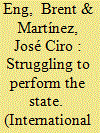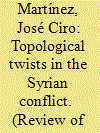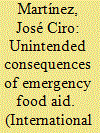|
|
|
Sort Order |
|
|
|
Items / Page
|
|
|
|
|
|
|
| Srl | Item |
| 1 |
ID:
155443


|
|
|
|
|
| Summary/Abstract |
Recent studies of civil war have problematized frameworks that rely on a strict binary between state-sanctioned order and anarchy. This paper extends these insights and combines them with theories of performativity to examine welfare practices during the Syrian conflict (2011–2015). Specifically, we argue that conceptualizing the state as a construct—as an effect of power—can expand the study of civil war beyond its quantifiable aspects and embrace the performative dimensions of political life. By means of everyday, iterative acts such as welfare provision, competing groups summon the state, and the political order it seeks to enshrine, into existence: they make it both tangible and thinkable. During civil war, the ability to perform these prosaic acts becomes a matter of pressing military and political concern. Through close scrutiny of various cases, we dissect the impact of subsidized bread provision by the Assad regime, the Free Syrian Army, and armed Islamist groups as they struggle to perform the state. Our aim is to bring attention to under-studied governance practices so as to analyze the otherwise opaque relations between welfare provision, military success, and civilian agency during Syria’s civil war.
|
|
|
|
|
|
|
|
|
|
|
|
|
|
|
|
| 2 |
ID:
172428


|
|
|
|
|
| Summary/Abstract |
This article seeks to question the epistemological monopoly of territory and scale in analyses of the Syrian conflict. It does so to both challenge static conceptualisations of space in the study of politics and analyse how seemingly remote actors influence wartime outcomes. Since 2011, NGOs, government bodies, and merchants have worked to connect Damascus to Tehran, Idlib to Istanbul, London to Dara‘a. These connections have proven crucial to the reliable supply of food, funds, and firepower. Yet rather than reveal the importance of foreign patrons or proxies on the ground, such dynamics speak to a world in which relationships matter more than distance, practices more than geopolitical position or a priori forms of alliance. Drawing on the work of John Allen, I suggest why thinking topologically about these dynamics better equips us to understand the political outcomes they help engender. To demonstrate the promise of this approach, I hone in on the partnerships, intermediaries, and connections that shape performances of political authority in Syria by examining one object crucial to its enactment: bread.
|
|
|
|
|
|
|
|
|
|
|
|
|
|
|
|
| 3 |
ID:
145270


|
|
|
|
|
| Summary/Abstract |
This article dissects the role of emergency food aid during the current Syrian conflict. Drawing on Séverine Autesserre's concept of frames and Giorgio Agamben's theory of sovereignty, we argue that the neutrality frame, which undergirds the majority of humanitarian relief efforts in Syria, obfuscates the impact of emergency food aid, both on sovereign power relations and local political dynamics. While neutrality appears benign, it has had a tangible impact on the Syrian civil war. Through close scrutiny of various case-studies, the article traces how humanitarian efforts reinforce the bases of sovereign politics while contributing to a host of what Mariella Pandolfi (1998) terms ‘mobile sovereignties’. In the process, humanitarian organizations reaffirm sovereign power while also engaging in similar activities. We then analyse how and why ostensibly neutral emergency food aid has unintentionally assisted the Assad regime by facilitating its control over food, which it uses to buttress support and foster compliance. By bringing external resources into life-or-death situations characterized by scarcity, aid agencies have become implicated in the conflict's inner workings. The article concludes by examining the political and military impact of emergency food assistance during the Syrian conflict, before discussing possible implications for the humanitarian enterprise more broadly.
|
|
|
|
|
|
|
|
|
|
|
|
|
|
|
|
|
|
|
|
|